'I'm Still the Same David Bowers': Former Roanoke Mayor Tries New Approach in Comeback Bid
Even in Bowers's lengthy political career, though, this year marks a first: 2024 is the first time Bowers has run as a Republican.
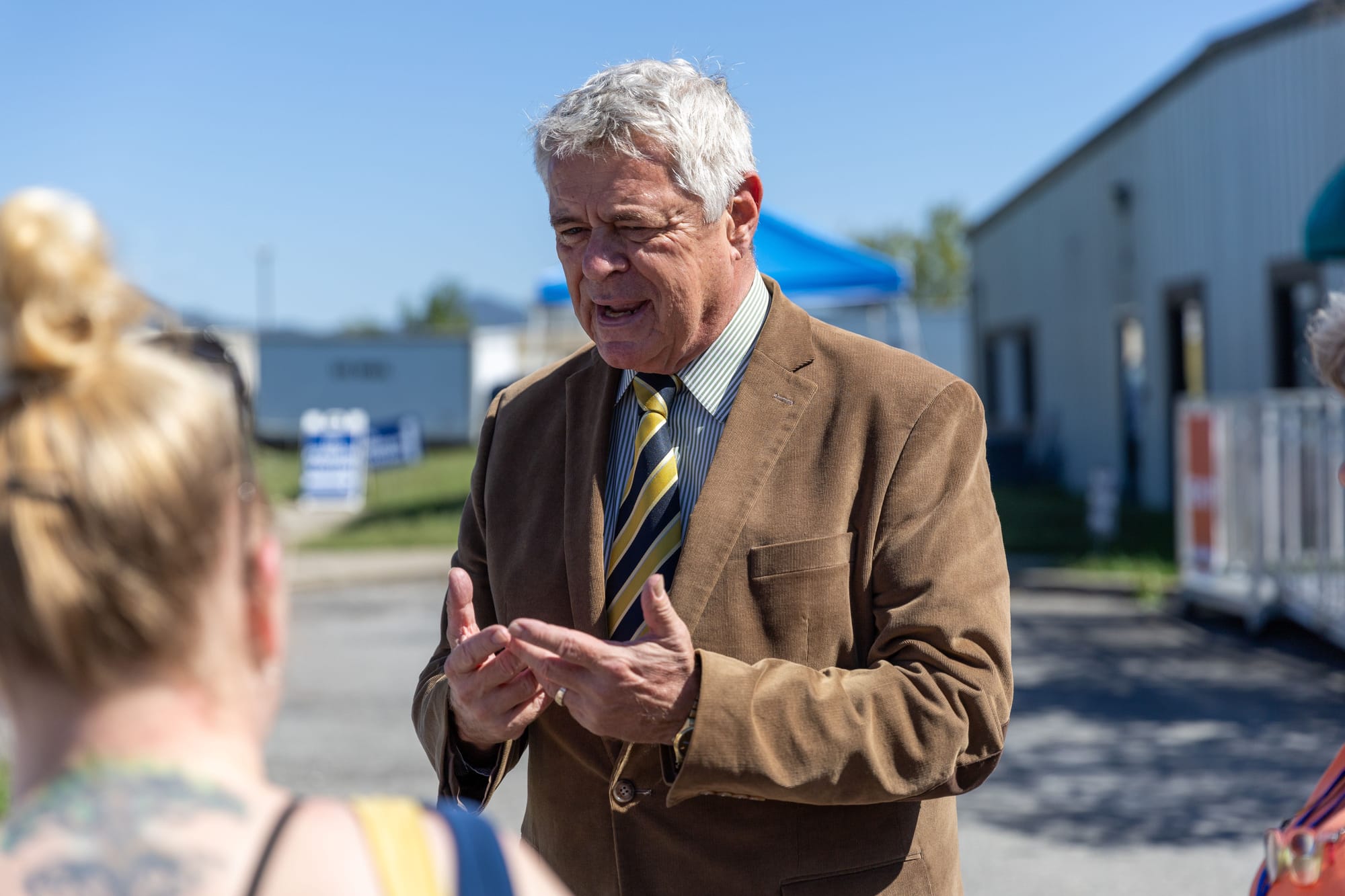
Forty years after he was first elected to Roanoke City Council, David Bowers is again running for mayor.
This election marks Bowers' seventh mayoral election. He won in 1992, 1996, 2008 and 2012, while losing in 2000 and 2020. That doesn't count his successful runs for City Council between 1984 and 1992, or his unsuccessful runs for council since then.
"I've been running for office in Roanoke since the fourth grade," Bowers said. "God's been good to me, the people of Roanoke have been good to me. I've spent a third of my life on Roanoke City Council. I've had a good career but I've still got a lot of energy, I've got a lot of enthusiasm, and I've obviously got the experience."
Even in Bowers' lengthy political career, though, this year marks a first: 2024 is the first time Bowers has run as a Republican. He declared his mayoral campaign in March, six months after announcing he and his wife were joining the Republican Party.
"It was personal, and it was political," Bowers, 72, said. "As far as I'm concerned, I'm still the same David Bowers. The [Democratic] party became very liberal. My wife and I are sociable Democrats; we're not socialists. The party also became emblematic of identity politics. If you haven't noticed, I'm white, male, straight, and a Catholic."
Outside of politics, Bowers and his wife, Margarita, enjoy hiking, history and traveling, according to his campaign website, as well as “immersing myself in Roanoke's rich offerings—its fine dining, vibrant events, and outdoor pursuits." Bowers is a longtime member of the Kiwanis Club of Roanoke, and teaches government as an adjunct at Virginia Western Community College. Bowers declined a request to interview Margarita for this story.
During an interview while campaigning during early voting, Bowers said he'd already cast his ballot — though he declined to name who was at the top of it.
"I'm not going to tell you who I voted for, but I'm supporting Donald Trump," said Bowers on the Monday after early voting opened. "I sought the nomination of the Republican Party for mayor, and won, I got it, and I think it would be dishonorable for me not to support other Republican candidates."
No Republican has won election to Roanoke City Council since 2000. That year, Bowers ran for reelection as a Democratic mayor, but finished third in a four-way race was won by Republican Ralph Smith with 35.4 percent, just 532 votes more than second-place Delvis "Mac" McCadden.
Twenty-four years later, Bowers is hoping for a repeat of that scenario — that Democrat Joe Cobb and independent Stephanie Moon Reynolds will split enough votes to open a path for him to emerge victorious as the first Republican on City Council since Smith.
'Level of discontent'
So, what would Bowers do with his third stint and fifth term as mayor?
He cites crime as the overriding factor behind his decision to run.
"There's a deep and wide level of discontent about the city and City Council, and people tell me they're fed up," Bowers said. "What I'm hearing over the last several years is that there's an increase in crime and gun violence. People are afraid. … That's not the Roanoke I knew."
Shootings spiked after the pandemic, though Roanoke police say violent crime has decreased over the last year, with seven homicides through early October, compared to 20 over the same time frame in 2023.
Bowers cites dozens of vacancies at the Roanoke Police Department as a major concern. (A city spokesperson said Friday the department is down 42 sworn officers out of 220 positions.). Such decline generally squares with national trends showing a decline in the number of officers following the 2020 death of George Floyd at the hands of Minneapolis police. Bowers said he'd back measures to improve officer recruitment and retention.
Bowers also opposes the City Council's decision to do away with single-family zoning, saying it will destroy neighborhoods.
"People buy a house because they can afford it and they like the house, and they like the neighborhood and expect it to stay the same, "Bowers said. "To chop up our house into six apartments, under the old law, we'd have to file a petition for a variance, notify all the neighbors. My neighbors would be in an uproar, and we wouldn't be invited to the neighborhood Christmas party, because our neighbors would be furious! Under the new law, my wife and I could lickety-split turn our house into a six- to eight-apartment unit building."
(The maximum number of units the new law would allow in Bowers’ house is three units.)
Bowers said he'd support reinstituting a Council policy adopted in 2012 that set aside 40 percent of the city's year-end surplus for schools. That policy was revoked in May 2024.
He also advocates for development of the forested Evans Spring property west of Valley View Mall.
"Evans Spring is fallow land, and it's the last remaining site for economic development in the city of Roanoke," Bowers said. "I just don't support the argument that Evans Spring is a racial decision. Some folks think it's 'urban renewal.' I do not."
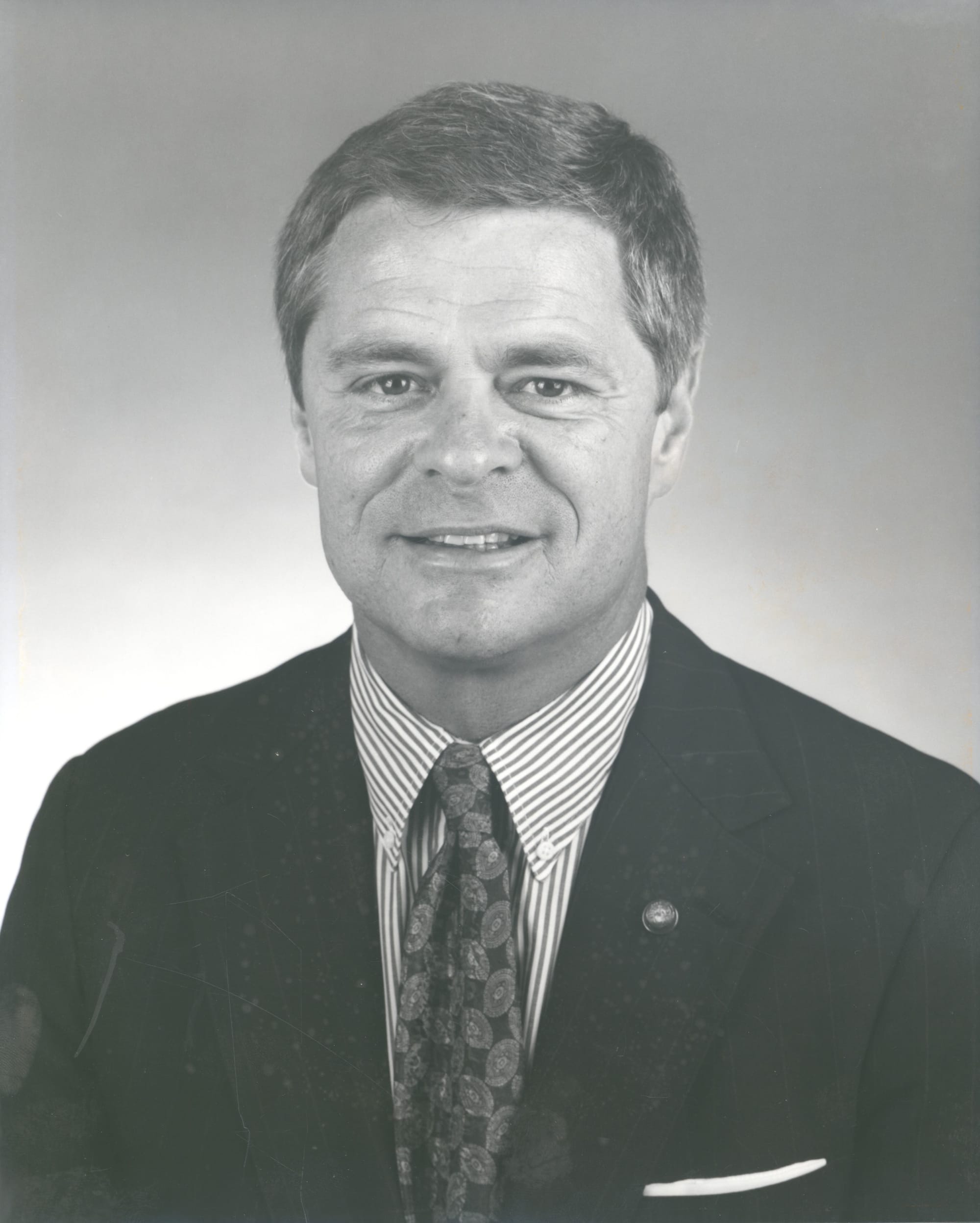
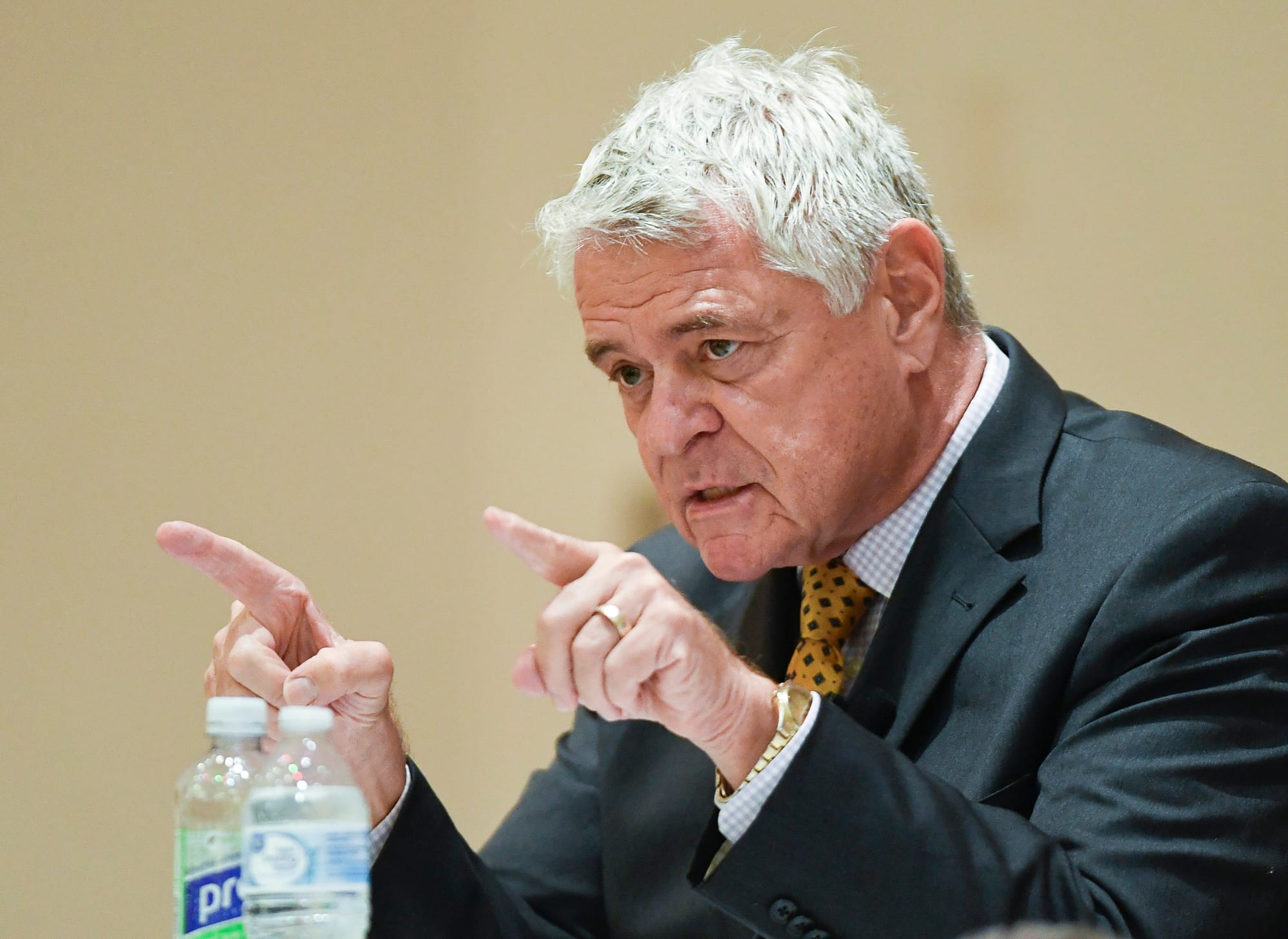
Above left, an undated photo from the time Bowers served as mayor in the 1990s. At right, Bowers makes a point during a mayoral candidates forum on Oct. 1, 2024 hosted by the Roanoke Regional Chamber of Commerce and Kiwanis Club at the City Market Building. PHOTO COURTESY OF VIRGINIA ROOM AT ROANOKE PUBLIC LIBRARIES; FILE PHOTO BY DAVID HUNGATE FOR THE ROANOKE RAMBLER
'I'm going to work with them'
Under Roanoke’s weak-mayor form of government, Bowers' previous terms have been shaped more by the city manager and Council majority than it has by the mayor's actions alone. Bowers was elected to succeed Noel Taylor midway through Bern Ewert's term as city manager. He cites the reopening of the Hotel Roanoke as the biggest accomplishment of his first mayoral stint, which helped reactivate the downtown district and commenced the city's ongoing relationship with Virginia Tech.
"Number two would be the greenways and the trails," Bowers said. "Number three would be, we started the process in the '90s of rebuilding the high schools. The fourth thing, the concept of the [Virginia Tech-Carilion Clinic] medical school started in the '90s."
The Council of the '90s split into factions over the future of Victory Stadium, which was built after World War II along Reserve Avenue and for decades hosted an annual football game between Virginia Tech and Virginia Military Institute.
Ultimately, the division contributed to Bowers's loss in 2000 and continued into the 2000s until it was resolved by the 2006 sweep of the "For the City" ticket of "independent Democrats,” which doomed the stadium. Ahead of the 2008 election, Bowers tried to seize control of the Roanoke Democratic Committee and failed. He still defeated incumbent Democratic Mayor Nelson Harris as an independent. Yet Bowers frequently found himself on the outs with a Council majority that frequently set its own priorities — even after he was reelected as a Democrat in 2012.
"David didn't mind disagreeing with everybody," said Roanoke Mayor Sherman Lea, who was a Council member during Bowers' second stint as mayor. "If he believed something, he'd stay with that. He'll go south when everybody's going north. He can be stubborn sometimes, but it's his commitment to what's best."
Bowers said he sets out to work with everyone.
"I learned a long time ago, I don't get to decide who sits on Roanoke City Council," Bowers said. "The people get to decide that. What I get to decide is whether or not I'm going to work with those persons chosen. I always decide that's what I'm going to do, some way or another. I'm going to work with them."
In November 2015, Bowers announced his decision not to seek reelection, saying, "For the first time in six mayoral elections, I’ve decided not to be a candidate." Just days later, he plunged the city into controversy with a news release on mayoral letterhead announcing he had decided "that it is presently imprudent to assist in the relocation of Syrian refugees to our part of Virginia."
That statement alone generated pushback, but it was a paragraph farther down that caught international attention: "I'm reminded that President Franklin D. Roosevelt felt compelled to sequester Japanese foreign nationals after the bombing of Pearl Harbor, and it appears that the threat of harm to America from Isis now is just as real and serious as that from our enemies then."
Former Star Trek actor and internet personality George Takei, who as a child during World War II lived in such incarceration camps, called out Bowers in a Facebook post the same day as the release went out. Addressing Bowers he said, "you demonstrably have failed to learn the most basic of American civics or history lessons." Bowers apologized and eventually had a cordial meeting with Takei when the actor visited Roanoke.
After sitting out the 2016 election, Bowers returned to challenge Lea in 2020, winning nearly 47 percent of the vote as an independent. In 2022, he ran as an independent for City Council, finishing seventh out of nine candidates. The following spring, Bowers met Virginia Gov. Glenn Youngkin, which prompted his shift to the Republican Party. He announced the change in September 2023.
"I prayed about it a lot," Bowers said. "I worried about it a lot. I thought about it a lot. And I finally made a decision, over a period of several months. Everybody in my family and in my wife's family — most of them were Democrats. They're all Republicans now."
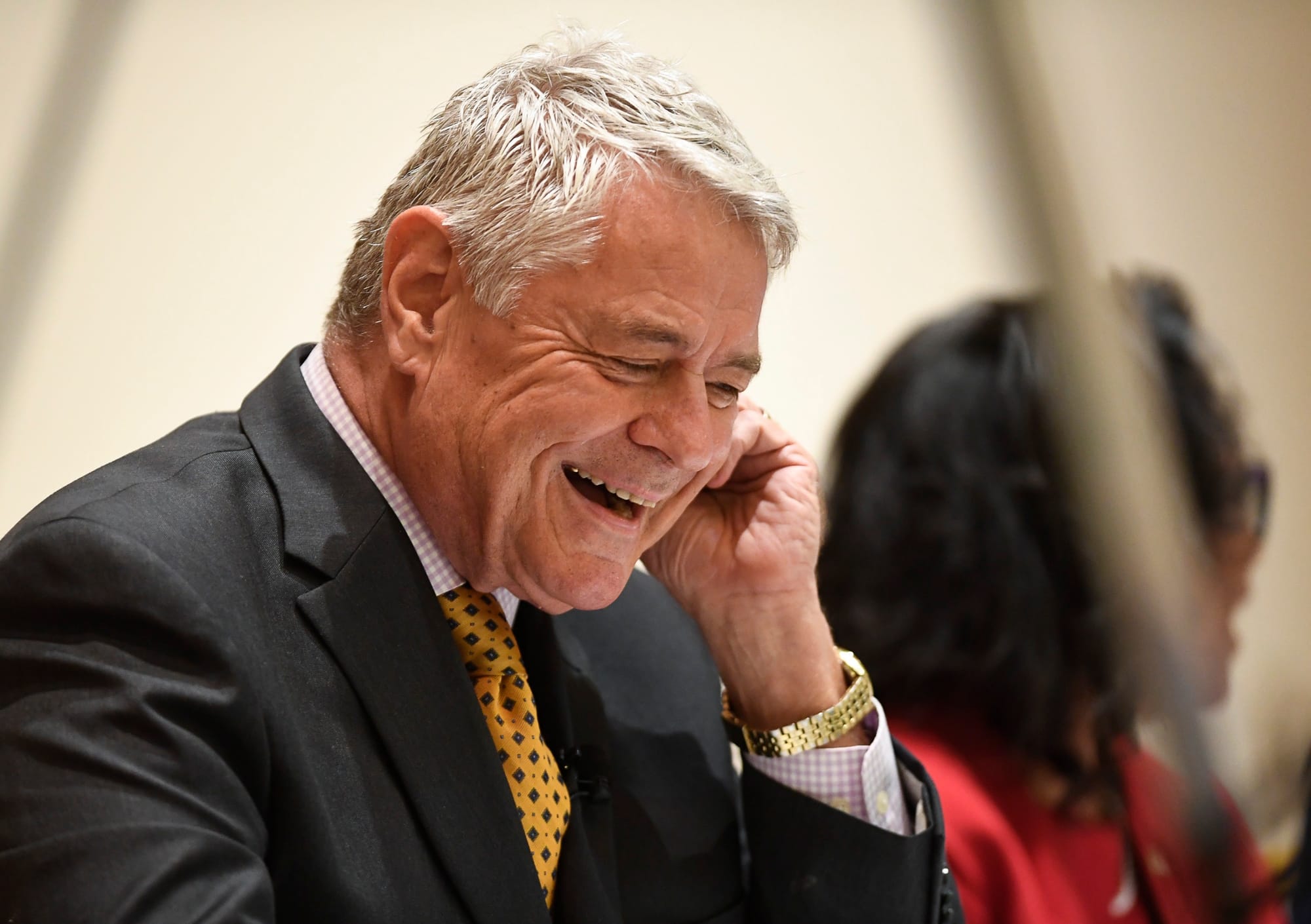
'More of a Republican message'
Roanoke City Republican Committee Chairman Charlie Nave said he'd always thought Bowers would eventually drift over to the GOP.
"He always cared about property rights, cared about law and order, cared about the middle class and working class being able to get by and thrive in Roanoke," Nave said. "That's really more of a Republican message these days than it is a Democrat message. His message is well within the bounds of the Republican Party and most normal, non-psychotic people here in Roanoke."
Still, not all Republicans are convinced.
"I like David. I also like Stephanie. They're both good people,” said Peg McGuire, who ran for Council as a Republican in 2020 and 2022. “I think Republican-leaning voters in Roanoke are torn between the two. Both have experience, and both have given clear visions for our city. When talking to these voters, I find that they are leaning toward Stephanie. I know that I'm voting for her. It was a hard decision.”
McGuire is not supporting Bowers, but he is receiving backing from the former mayor who delivered Bowers his first defeat in 2000.
"Had you been around town last week, you may have seen one ex-mayor putting up signs for another ex-mayor," said Ralph Smith. "I put up Trump signs and along the way put up some David Bowers signs. Is he as conservative overall as I am? Probably not. [But] it's a big tent. When he decided more recently to become a Republican, I was welcoming and certainly have endorsed him."
Smith said Bowers has always been pro-life, a position that grinds against the modern Democratic Party. Asked about his abortion stance, Bowers declined to get specific.
"I'm not an altar-boy Catholic, but I'm Catholic," Bowers said. "That's all I'm going to—. Look, I don't have any influence other than any other voter on national issues. I'm running to be the mayor of Roanoke. I'm going to focus on Roanoke issues."
Bowers did express some concern about election integrity in Roanoke, especially after Smith mentioned he was worried about a "voting gray area," which is "when you approach someone not capable of making a decision and fill out their ballot for them."
Asked to comment on Smith’s remark, Bowers said, "I think the absentee ballot rules are very loose."
Virginia expanded early voting and vote by mail in the pandemic year of 2020, when Bowers lost to Lea. On election night, votes tabulated from that day showed Bowers leading Lea, but when thousands of early votes and mail ballots were reported, Bowers trailed the mayor.
Andrew Cochran, then the city’s voter registrar, recalled having three different conversations with Bowers about his concerns over the results.
"He wouldn’t let that go," Cochran said. "He didn’t come out and say it was fraud or anything; he just thought it was fishy."
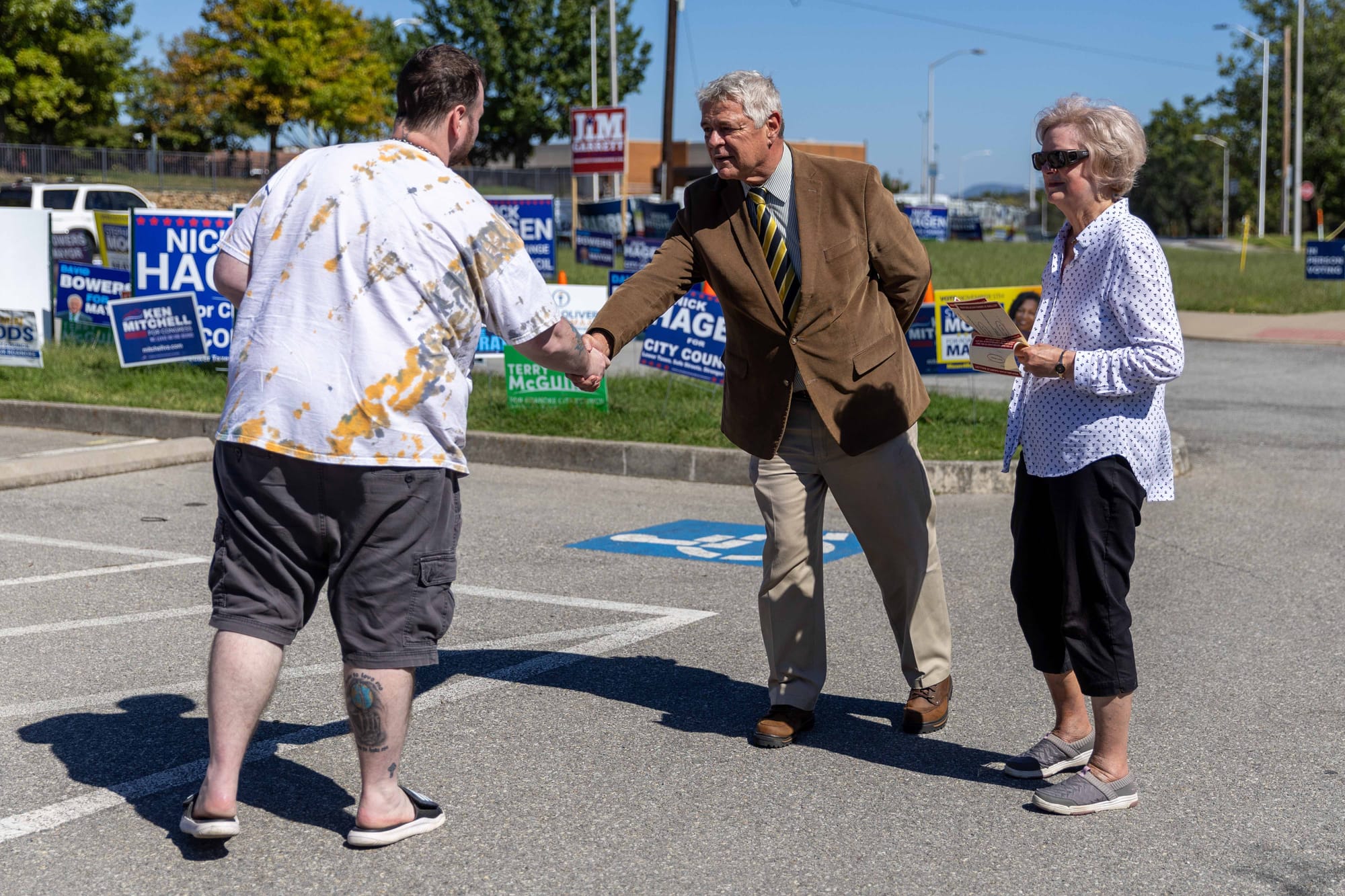
'It always seems to be about David'
Bowers' more conservative stances, as well as his serial candidacy, have inspired sharp criticism from Democrats and activists.
"Throughout the years, I'm most curious about what David Bowers does for the community outside of running for political office," said former Roanoke City Democratic Committee chair Beth Deel. "I've not been able to pinpoint what moves him to, quote, 'serve.' A lot of times, especially with older leaders, they'll really be involved in bringing up the next generation of leaders, or leadership from different areas in the city. It's always been curious to me [that] it always seems to be about David, not about Roanoke and what we're doing."
Deel said Bowers's moment has passed. "We have the possibility of the first female president in the history of our country, and this old white guy thinks it's his time," she said.
That was echoed by gun safety activist Catherine Koebel Stromberg: "The man is like a dinosaur that just doesn't know when to retire."
Koebel said Bowers's 2015 remarks about Syrian refugees and internment camps not only embarrassed Roanoke, but opened the door to hard-right activists to demonstrate for guns and Confederate flags.
"The people who showed up to support David Bowers in his targeting of Syrians were the absolute worst kind of threaten-you-with-a-gun dudes," Keobel said. "They were the guys doing the open-carry demonstrations with the [AR-15 rifles] outside the civic center. The kind of people who felt empowered were the same people who felt it was OK to come from Bedford and bring guns to Roanoke's Christmas parade. Do you know how much harder it is to sell Roanoke as this amazing place to live, with different cultures and cuisines if we're known for a bigot in charge? 'Mayor bigot.' Awesome."
Bowers, per usual, shrugged off the criticism.
"Everybody's got their opinion," he said. "I don't like what's going on in the city. Sure, you're going to have some people who don't like you and are not going to agree with you. I'm running to win and make a change in Roanoke. And by the way, I'm still not old enough to run for president."

